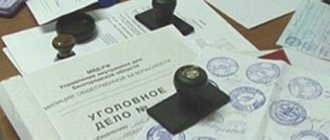Article 82 of the Code of Criminal Procedure of the Russian Federation. Storage of physical evidence
1. Physical evidence must be kept in the criminal case until the verdict enters into legal force or until the expiration of the period for appealing the decision or ruling to terminate the criminal case and be transferred along with the criminal case, except for the cases provided for in this article. In the event that a dispute over the right to property, which is material evidence, is subject to resolution through civil proceedings, the material evidence is stored until the court decision comes into force.
2. Physical evidence in the form of:
1) items that, due to bulkiness or other reasons, cannot be stored in a criminal case, including large quantities of goods, the storage of which is difficult or the costs of providing special storage conditions for which are commensurate with their value:
a) are photographed or filmed, if possible sealed and, by decision of the inquiry officer or investigator, transferred for storage in accordance with the legislation of the Russian Federation in the manner established by the Government of the Russian Federation. A document on the location of such material evidence is attached to the materials of the criminal case, and a sample of material evidence sufficient for a comparative study may also be attached;
(clause “a” as amended by Federal Law dated July 21, 2014 N 245-FZ)
b) are returned to their rightful owner, if this is possible without prejudice to evidence;
c) if it is impossible to ensure their storage in the ways provided for in subparagraphs “a” and “b” of this paragraph, they are assessed and, with the consent of the owner or by court decision, transferred for sale in accordance with the legislation of the Russian Federation in the manner established by the Government of the Russian Federation. The proceeds from the sale of material evidence are credited in accordance with this part to the deposit account of the body that made the decision to confiscate said material evidence for the period provided for in part one of this article. A sample of material evidence sufficient for a comparative study may be attached to the materials of the criminal case;
(clause “c” as amended by Federal Law dated April 22, 2010 N 62-FZ)
1.1) large quantities of goods, the storage of which is difficult or the costs of providing special storage conditions for which are commensurate with their value, can be transferred for safekeeping to the owner;
(clause 1.1 introduced by Federal Law dated April 22, 2010 N 62-FZ)
2) perishable goods and products, as well as property subject to rapid obsolescence, the storage of which is difficult or the costs of providing special storage conditions for which are commensurate with their value:
a) are returned to their owners;
b) if return is impossible, they are assessed and, with the consent of the owner or by court decision, transferred for sale in accordance with the legislation of the Russian Federation in the manner established by the Government of the Russian Federation. The proceeds from the sale of material evidence are credited in accordance with this part to the deposit account of the body that made the decision to confiscate said material evidence for the period provided for in part one of this article. A sample of material evidence sufficient for a comparative study may be attached to the materials of the criminal case;
c) with the consent of the owner or by court decision, they are destroyed in the manner established by the Government of the Russian Federation, if such perishable goods and products have become unusable. In this case, a protocol is drawn up in accordance with the requirements of Article 166 of this Code;
(Clause 2 as amended by Federal Law dated April 22, 2010 N 62-FZ)
3) narcotic drugs, psychotropic substances, plants containing narcotic drugs or psychotropic substances or their precursors, or parts thereof containing narcotic drugs or psychotropic substances or their precursors, seized from illicit trafficking, as well as items the long-term storage of which is dangerous to life and health people or for the environment, after carrying out the necessary research, they are transferred for technological processing or destroyed by a court decision in the manner established by the Government of the Russian Federation, about which a protocol is drawn up in accordance with the requirements of Article 166 of this Code. A sufficient sample for comparative research of a narcotic drug, psychotropic substance, plant containing narcotic drugs or psychotropic substances or their precursors, or parts thereof containing narcotic drugs or psychotropic substances or their precursors, seized from illicit trafficking shall be attached to the materials of the criminal case;
(as amended by Federal Laws dated July 11, 2011 N 195-FZ, dated December 31, 2014 N 494-FZ)
3.1) money, valuables and other property received as a result of the commission of a crime, and income from this property discovered during investigative actions, are subject to arrest in the manner established by Article 115 of this Code;
(clause 3.1 as amended by Federal Law dated July 27, 2006 N 153-FZ)
4) valuables after performing the necessary investigative actions:
a) are deposited with a bank or other credit organization for the period provided for in part one of this article, except for the case provided for in subparagraph “b” of this paragraph;
b) are returned to their rightful owner, if this is possible without prejudice to evidence;
(Clause 4 as amended by Federal Law dated July 21, 2014 N 245-FZ)
4.1) money after carrying out the necessary investigative actions are photographed or filmed and:
a) are returned to their rightful owner in the manner established by the Government of the Russian Federation;
b) in the absence or failure to identify the legal owner, or if it is impossible to return material evidence to the legal owner for other reasons, they are deposited in the financial unit of the body that made the decision to seize said material evidence, or in a bank or other credit organization for the period provided for in part one of this articles, or are stored in a criminal case, if the individual characteristics of banknotes are important for proof;
(clause 4.1 introduced by Federal Law dated July 21, 2014 N 245-FZ)
5) electronic storage media:
a) are stored in a sealed form under conditions that exclude the possibility of unauthorized persons becoming familiar with the information contained on them and ensuring their safety and the safety of the specified information;
b) are returned to their rightful owner after inspection and other necessary investigative actions, if this is possible without prejudice to evidence;
(Clause 5 introduced by Federal Law dated July 28, 2012 N 143-FZ)
6) light industrial goods seized from illegal circulation, the list of which is established by the Government of the Russian Federation, are transferred for destruction by court decision in the manner established by the Government of the Russian Federation, of which a protocol is drawn up in accordance with the requirements of Article 166 of this Code. A sample of light industry goods seized from illegal circulation, sufficient for comparative research, is attached to the materials of the criminal case;
(Clause 6 introduced by Federal Law dated July 23, 2013 N 195-FZ)
7) seized in accordance with the legislation on state regulation of the production and circulation of ethyl alcohol, alcoholic and alcohol-containing products and on limiting the consumption (drinking) of alcoholic products from the illegal circulation of ethyl alcohol, alcoholic and alcohol-containing products, as well as items used for illegal production and ( or) the circulation of ethyl alcohol, alcoholic and alcohol-containing products, after carrying out the necessary research, are transferred for destruction, disposal or sale by court decision in the manner established by the Government of the Russian Federation, about which a protocol is drawn up in accordance with the requirements of Article 166 of this Code, or transferred for storage in the manner established by the Government of the Russian Federation. Funds received from the sale of material evidence are credited in accordance with this part to the deposit account of the body that made the decision to confiscate said material evidence for the period provided for in part one of this article;
(Clause 7 introduced by Federal Law dated December 31, 2014 N 494-FZ)
 confiscated gaming equipment that was used in the illegal organization and (or) conduct of gambling is transferred for destruction by court decision in the manner established by the Government of the Russian Federation, of which a protocol is drawn up in accordance with the requirements of Article 166 of this Code. Photo and film materials, video recordings of material evidence, and a sample of material evidence sufficient for a comparative study may also be attached to the materials of the criminal case.
confiscated gaming equipment that was used in the illegal organization and (or) conduct of gambling is transferred for destruction by court decision in the manner established by the Government of the Russian Federation, of which a protocol is drawn up in accordance with the requirements of Article 166 of this Code. Photo and film materials, video recordings of material evidence, and a sample of material evidence sufficient for a comparative study may also be attached to the materials of the criminal case.
(Clause 8 introduced by Federal Law dated March 28, 2017 N 51-FZ)
9) animals whose physical condition does not allow them to be returned to their habitat:
a) are photographed or filmed or filmed; by decision of the inquiry officer or investigator, they are transferred for storage in accordance with the legislation of the Russian Federation in the manner established by the Government of the Russian Federation. A document on the location of such material evidence is attached to the materials of the criminal case;
b) are returned to their rightful owner, if this is possible without prejudice to evidence;
c) if it is impossible to ensure their storage in the ways provided for in subparagraphs “a” and “b” of this paragraph, with the consent of the legal owner or by court decision, they are transferred free of charge for maintenance and breeding in the manner established by the Government of the Russian Federation, of which a protocol is drawn up in accordance with with the requirements of Article 166 of this Code. Photo and video recordings of the seized animal, as well as other information and documents containing species and individual characteristics of the animal that allow its identification (inventory number, nickname, tags and others, and, if necessary, also research results) are attached to the materials of the criminal case;
d) if it is impossible to transfer free of charge for maintenance and breeding, they are assessed and, with the consent of the owner or by a court decision, transferred for sale in accordance with the legislation of the Russian Federation in the manner established by the Government of the Russian Federation. The proceeds from the sale of material evidence are credited in accordance with this part to the deposit account of the body that made the decision to confiscate said material evidence for the period provided for in part one of this article.
(Clause 9 introduced by Federal Law dated December 29, 2017 N 468-FZ)
2.1. After urgent investigative actions are taken, if it is impossible to return electronic storage media seized during investigative actions to their legal owner, the information contained on these media is copied at the request of the legal owner of the seized electronic storage media or the owner of the information contained on them. Copying of this information onto other electronic media provided by the legal owner of the seized electronic media or the owner of the information contained on them is carried out with the participation of the legal owner of the seized electronic media or the owner of the information contained on them and (or) their representatives and a specialist in the presence of attesting witnesses. division of the preliminary investigation body or in court. When copying information, conditions must be provided that exclude the possibility of its loss or change. Copying information is not allowed if it may interfere with the investigation of a crime. Electronic storage media containing copied information are transferred to the legal owner of the seized electronic storage media or the owner of the information contained on them. A protocol is drawn up on the copying of information and the transfer of electronic media containing copied information to the legal owner of the seized electronic media or the owner of the information contained on them in accordance with the requirements of Article 166 of this Code.
(Part 2.1 as amended by Federal Law dated November 29, 2012 N 207-FZ)
3. Other conditions for storage, recording and transfer of material evidence, including their individual categories, are established by the Government of the Russian Federation.
(Part 3 as amended by Federal Law dated December 28, 2013 N 432-FZ)
4. In the cases provided for in subparagraphs “a” and “b” of paragraph 1, paragraph 1.1, subparagraph “a” of paragraph 2, paragraphs 3.1, 4 and 4.1, subparagraph “b” of paragraph 5, subparagraphs “a” and “b” of paragraph 9 of part two and part two.1 of this article, the inquiry officer, investigator or judge makes a decision.
(as amended by Federal Laws dated July 28, 2012 N 143-FZ, dated July 21, 2014 N 245-FZ, dated December 29, 2017 N 468-FZ)
4.1. In the cases provided for by subparagraph "c" of paragraph 1, subparagraphs "b" and "c" of paragraph 2 and paragraphs 3 and 6 - 8 of part two of this article, the investigator, with the consent of the head of the investigative body or the investigator with the consent of the prosecutor, initiates proceedings before the court at the place of proceedings investigation, a corresponding petition if the owner has not given consent to the sale, disposal or destruction of the property.
(Part 4.1 was introduced by Federal Law dated April 22, 2010 N 62-FZ, as amended by Federal Laws dated July 23, 2013 N 195-FZ, dated December 31, 2014 N 494-FZ, dated March 28, 2017 N 51-FZ)
4.2. In the cases provided for in subparagraphs “c” and “d” of paragraph 9 of part two of this article, the investigator, with the consent of the head of the investigative body or the investigator with the consent of the prosecutor, initiates a corresponding petition before the court at the place of investigation, if the owner has not agreed to the transfer free of charge or sale physical evidence or the owner is missing or not identified.
(Part 4.2 introduced by Federal Law dated December 29, 2017 N 468-FZ)
5. When a criminal case is transferred by an inquiry body to an investigator or from one inquiry body to another or from one investigator to another, as well as when a criminal case is sent to a prosecutor or to a court, or when a criminal case is transferred from one court to another, material evidence is transferred along with the criminal case, for except in cases provided for in this article.
Previous article | Code of Criminal Procedure of the Russian Federation | Next article
Commentary to Art. 82 of the Criminal Procedure Code of the Russian Federation
Comments on the articles of the Code of Criminal Procedure will help you understand the nuances of criminal procedure law.
1. The commented article regulates the procedure for storing material evidence. It establishes a rule according to which material evidence must be kept in a criminal case until the verdict enters into legal force or until the expiration of the period for appealing the decision or ruling to terminate the criminal case and be transferred along with it (BVS RSFSR. 1963. No. 8. P. 11) . This rule does not apply to cases provided for in parts 2 - 3 of the commented article.
If a dispute arises about the right to property recognized as material evidence, which is subject to resolution in civil proceedings, the material evidence is stored until the court decision comes into force.
2. In relation to material evidence in the form of items that, due to bulkiness or other reasons, cannot be stored in a criminal case, including large quantities of goods, the storage of which is difficult or the costs of providing special storage conditions for which are commensurate with their value, the law establishes mandatory photographing them or recording them on video or film, if possible, sealing them and storing them in a place indicated by the inquiry officer or investigator (subparagraph “a”, paragraph 1, part 2 of the commented article). The file must contain a document indicating the location of such material evidence. These measures are aimed at preventing the possibility of substitution, mixing of material evidence with other items, and their preservation unchanged. If necessary, a sample of material evidence sufficient for a comparative study is attached to the criminal case, about which a protocol is drawn up in accordance with the requirements of Art. 166 and 167 Code of Criminal Procedure.
3. The items specified in paragraph 1 of part 2 of the commented article, if possible without prejudice to evidence, may be returned to their owner on the basis of a reasoned decision. In this case, the owner’s petition is attached to the case materials, as well as his obligation to keep the material evidence until the end of the proceedings.
4. It is possible to transfer the material evidence listed in clause 1 of part 2 of the commented article for sale in the manner established by the Government of the Russian Federation (subparagraph “c” of clause 1 of part 2 of this article), for which a reasoned decision is made (part. 4 commented articles). In this case, it is permissible to attach to the criminal case a sample of material evidence sufficient for a comparative study, for which a protocol is drawn up in accordance with the requirements of Art. 166 and 167 Code of Criminal Procedure.
5. In accordance with paragraph 2 of part 2 of the commented article, material evidence in the form of perishable goods and products, as well as property subject to rapid obsolescence, the storage of which is difficult or the costs of providing special storage conditions for which are commensurate with their value, can be returned their owners. Before this, they must be photographed or filmed on video or film. The file must contain a document confirming their return to the owners.
If it is impossible to return such material evidence to the owners, the law allows for their transfer for sale in the manner established by the Government of the Russian Federation. Before doing this, they should be photographed or filmed or videotaped. It is permissible to attach to a criminal case a sample of material evidence sufficient for a comparative study.
6. If material evidence of perishable goods or products has become unusable, they are destroyed, about which a protocol is drawn up in accordance with the requirements of Art. 166 Code of Criminal Procedure.
7. Physical evidence in the form of ethyl alcohol, alcoholic and alcohol-containing products seized from illegal circulation, as well as items specified in clause 3, part 2 of the commented article, are transferred for their technological processing or destroyed, about which a protocol is drawn up in accordance with the requirements of Art. . 166 Code of Criminal Procedure. Before this, the necessary research can be carried out on these items.
8. Physical evidence in the form of money, valuables and other property obtained as a result of the commission of a crime, and income from this property discovered during investigative actions, are subject to seizure in the manner established by Art. 115 of the Code of Criminal Procedure (see comments to this article).
9. Money and valuables recognized as material evidence, seized during investigative actions, are deposited in a bank or other credit institution in accordance with subpara. “b” paragraph 2 of part 2 of this article (subparagraph “a” of paragraph 4 of part 2 of the commented article).
If the individual characteristics of banknotes are important for a criminal case, they can be stored in the criminal case.
Counterfeit money or securities, recognized as material evidence of the guilt of the accused, remain on file for the entire period of storage of the latter (BVS RSFSR. 1966. N 6. P. 8).
10. The law (Part 3 of the commented article) allows for other conditions for storage, recording and transfer of certain categories of material evidence, which may be established by the Government of the Russian Federation.
11. Except for the cases provided for in the commented article, when transferring a case by an inquiry body to an investigator or from one inquiry agency to another or from one investigator to another, as well as when sending a criminal case to a prosecutor or to court or when transferring a criminal case from one court to another, material evidence transferred along with the criminal case.



